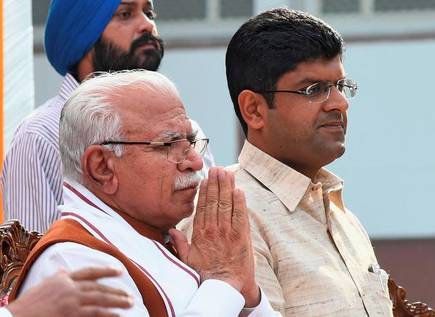The first reaction to the government of Haryana’s
recent stipulation of reserving jobs in the private sector for people domiciled
in the state has predictably come from employers. Private sector companies fear
that the new rule—encapsulated in an ordinance—will, by hindering their
recruitment efforts, hamper their ability to get workers with appropriately
high skills. To be sure, the Haryana government’s decision was influenced by
pre-election promises by one of the BJP-led coalition’s partners, Deputy Chief Minister Dushyant Chautala’s Jannayak Janta Party (JPP).
The Haryana ordinance
stipulates that 75% of all new recruitment by companies based in or operating
in the state have to be people who are domiciled in the state. The rule will
apply to jobs that pay a salary of Rs 50,000 per month or less. Industries
operating in the state have already made a plea to the government to reconsider
the move but by all reckoning that is unlikely to happen.
Moves such as
Haryana’s aren’t new in India. Last year, a Maharashtra minister from the Shiv
Sena party demanded that 100% of jobs in private companies in his state ought
to be reserved for local youth. A year ago, Andhra Pradesh passed a law to
reserve 75% of jobs for youths belonging to the state. States such as Assam,
Odisha and Madhya Pradesh have been contemplating similar laws. And in southern
Indian states, which have witnessed substantial migration of workers from
northern India, similar sentiments have begun showing up.
The call for
protection or reservation of local youths’ jobs is obviously a populist move,
and political parties are often motivated by the electoral objectives of
garnering votes. But it is also a sign of nativism, a policy of protecting the
interests of native-born or established inhabitants against those of
immigrants. It also reeks of jingoism and xenophobia, and while employers are
understandably upset by such protectionist policies, the inherent harm that
such policies can do run deeper.
India’s Constitution
guarantees individuals the right to freedom of movement within India and the
right to seek employment anywhere within the country’s territory. Its various
articles also specify that there can be no discrimination on the basis of where
one is domiciled or born when it comes to employment. In that regard, the
recent moves in various states to reserve private sector jobs for locals may seem
unconstitutional and something that eventually the judiciary may have to take
up.
Nativist movements are
not new in India. In the past decades, local parties such as the Shiv Sena in
Maharashtra; the DMK in Tamil Nadu; the Akali Dal in Punjab; and several other
smaller regional parties have expressed sentiments against inter-state immigration.
Even in Bengal, a relatively obscure party, Amra Bangali, has for long
demanded, among a long list of other things, 100% reservation of jobs for
Bengali youth.
Curiously, inter-state
immigration is not of a huge scale in India. One study based on census data
shows that on an average not more than 10% of workers in a district are from
another state. In some states, the proportion is much lower. Also, seasonal
migration has been common in many states. During harvest time or other
labour-intensive seasons, northern states such as Punjab and Haryana depend
heavily on workers who migrate from the eastern states of India. Many of the
stranded migrant workers whose plight was highlighted when the Indian
government announced a lockdown across the country after the outbreak of the
Covid pandemic were agricultural and construction workers who routinely migrate
out of their states to seek casual or seasonal employment.
Diversity in India is
unlike in most other countries. Its population of 1.3 billion is hardly
homogenous. Besides being diverse in terms of language, food, and culture,
there are sharply contrasting economic disparities between states. But every
Indian citizen has a right to decide where he or she would like to live; work;
or settle down. Curbs such as Haryana’s new law would seriously hinder that
right. But they would also impair economic development and equitable growth.
The short-term
political gains of a move such as Haryana’s reservation policy are obvious.
Appeasement of local youth could help in ensuring the government’s re-election
once its term is completed. And, of course, if jobs are reserved for them, the
future of local unemployed youth could brighten. But consider this. Haryana is
among one of the India’s states that attracts substantial private sector
investment—mainly because it has cities such as Gurgaon that have quickly
become hubs for technology, automotive, and financial services companies. If
employers are restricted by a reservation norm some of them could consider
shifting out of the state.
Also, for people
living in economically weaker states where employment opportunities are limited
such restrictions could have adverse economic impact. Moreover, if more and
more states follow in the footsteps of Haryana and Andhra Pradesh, what would
it make of India’s much touted claim of having harmony in diversity? Would it
lead to greater intolerance between communities and regions? Would it foster
more inter-state jingoism? And, could it, conceivably, threaten the democratic
structure that is at the heart of the country?
There is also the
matter of the Constitution and the freedom it ensures for Indian citizens. The
spawning of policies that are inherently anti-immigrant in nature could
seriously impinge on that freedom. It is perhaps time for the courts to examine
these issues before they grow into a full-blown crisis.

